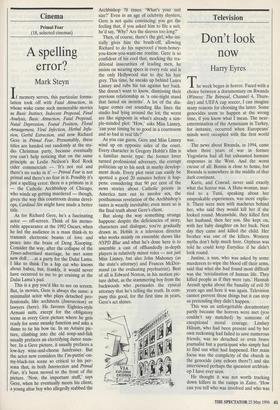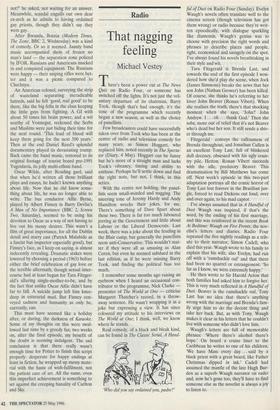Television
Don't look now
Harry Eyres
The week began in horror. Faced with a choice between a documentary on Rwanda (Witness: The Betrayal, Channel 4, Thurs- day) and UEFA cup soccer, I can imagine many reasons for choosing the latter. Some genocides seem to happen at the wrong time, if you know what I mean. The near- extermination of the Armenians in Turkey, for instance, occurred when Europeans' minds were occupied with the first world war.
The news about Rwanda, in 1994, came when three years of war in former Yugoslavia had all but exhausted humane responses in the West. And the worst excuse of all: Bosnia is close to home, but Rwanda is somewhere in the middle of that dark continent.
Kurtz, and Conrad, never said exactly what the horror was. A Hutu woman, mar- ried to a Tutsi, speaking about her unspeakable experiences, was more explic- it. There were men with machetes behind her, who said they would kill her if she looked round. Meanwhile, they killed first her husband, then her son. She kept on, with her baby daughter on her back. Next day they came and killed the child. Her brother was one of the killers. Western myths don't help much here. Orpheus was told he could keep Eurydice if he didn't look round.
Justine, a nun, who was asked by some murderers to wipe the blood off their arms, said that what she had found most difficult was the `trivialisation of human life. They killed people as if they were rats.' Hannah Arendt spoke about the banality of evil 50 years ago and here it was again. Television cannot prevent these things but it can stop us pretending they didn't happen.
This was an unforgettable documentary partly because the horrors were met (you couldn't say matched) by someone of exceptional moral courage. Lindsey Hilsum, who had been present and by her own reckoning had failed to save numerous friends, was no detached or even brave journalist but a participant who simply had to find out what had happened. Her main focus was the complicity of the church in the genocide (any echoes there?) and she interviewed perhaps the queasiest archbish- op I have ever seen.
He thought it was not worth tracking down killers in the camps in Zaire. 'How can you tell who was involved and who was not?' he asked, not waiting for an answer. Meanwhile, scandal engulfs our own dear ex-arch as he admits to having ordained gay priests, though they didn't say they were gay.
After Rwanda, Bosnia (Modem Times, The Zone, BBC 2, Wednesday) was a kind of comedy. Or so it seemed. Jaunty band music accompanied shots of frozen no man's land — the separation zone policed by IFOR. Russians and Americans mucked in and compared equipment. The Russians were happy — their sniping rifles were bet- ter and it was a picnic compared to Chechnya.
An American colonel, surveying the strip of wasteland separating ineradicable hatreds, said he felt 'good, real good' to be there, like the big fella in the class keeping the little guys from fighting. A GI with about 50 times his brain power, and a wit worthy of Vonnegut, reckoned the Serbs and Muslims were just biding their time for the next round. 'This load of blood will keep them going for the next 500 years.' Then at the end Daniel Reed's splendid documentary played its devastating trump. Back came the band music, restored to its original footage of tourist board pre-1991 Yugoslavia, its jolly multi-ethnic band.
Oscar Wilde, after Reading gaol, said that when he'd written all those brilliant plays and essays, he hadn't known anything about life. Now that he did know some- thing about life, he was no longer able to write. The bus conductor Alfie Byrne, played by Albert Finney in Barry Devlin's A Man of No Importance (BBC 2, Screen Two, Saturday), seemed to be using his devotion to Oscar as a way of not having to live out his messy desires. This wasn't a film of great importance, for all the Dublin detail and starry cast (Patrick Malahide as a fascist bus inspector especially good), but Finney's face, as I keep on saying, is almost indecently revealing. Dramatic stakes were lowered by choosing a period (1963) before either the brief celebration of gay love or the terrible aftermath, though sexual inter- course had at least begun for Tara Fitzger- ald's alluring single-mother-to-be, and by the fact that unlike Oscar Alfie didn't have far to fall. A suicide jump left him knee- deep in esturarial mud. But Finney con- veyed sadness and humanity as only he, currently, can.
This must have seemed like a holiday after, or during, the darkness of Karaoke. Some of my thoughts on this were swal- lowed last time by a greedy fax; two weeks on, after the final episode, my benefit of the doubt is seeming indulgent. The sad conclusion is that there really wasn't enough time for Potter to finish this script properly: desperate for happy endings at least in fiction, he wrapped up messy mate- rial with the haste of wish-fulfilment, not the patient care of art. All the same, even this imperfect achievement is something to set against the creeping banality of Carlton and Sky.



























































 Previous page
Previous page